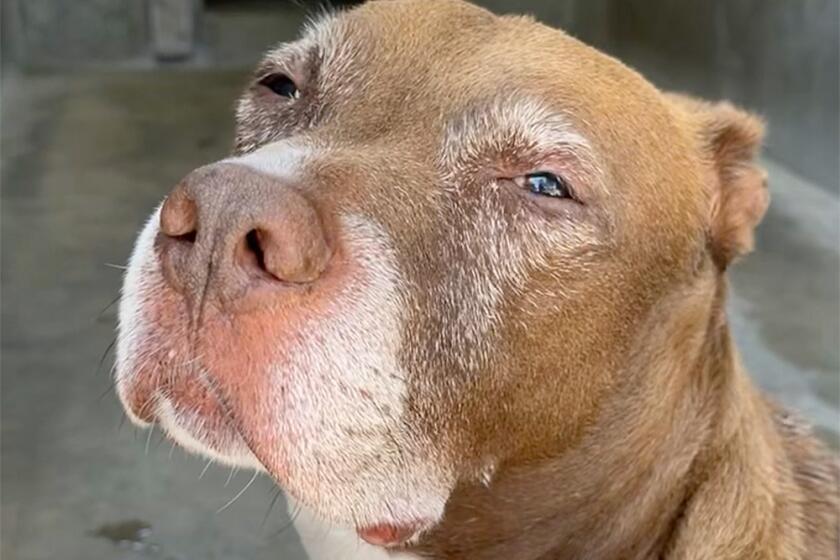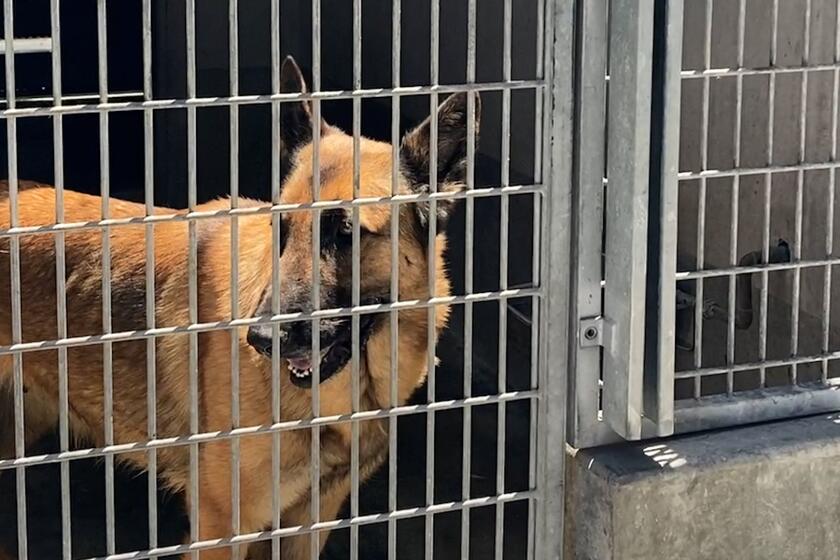Rabbits, guinea pigs and hamsters face neglect at L.A. city shelters, volunteers say
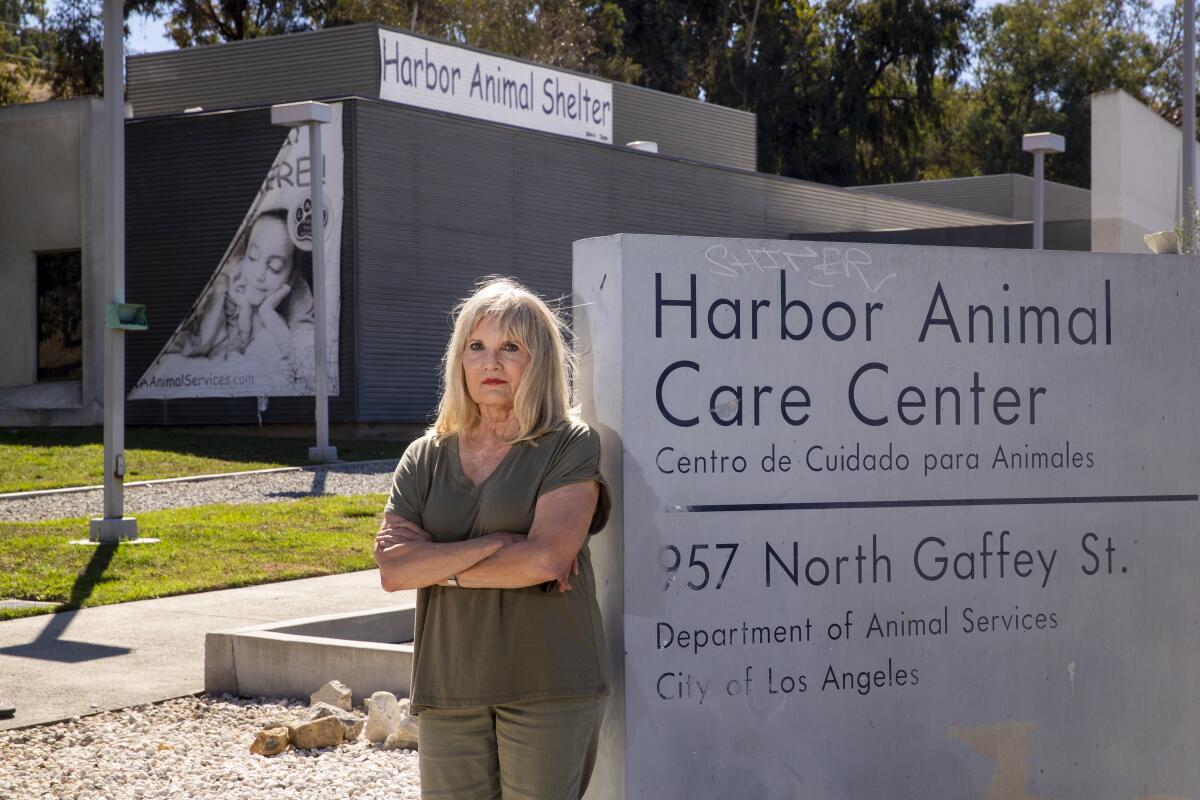
- Share via
When the Harbor Animal Care Center faced a food crunch in August, volunteer Jan Bunker logged on to Nextdoor to plead for donations.
“Hi, animal lovers! Down at Harbor Shelter in San Pedro, we are totally out of rabbit food and hay for both rabbits and guinea pigs,” Bunker wrote.
Her post got a wave of responses, and strangers delivered hay — a necessity for rabbits and guinea pigs, who can quickly die if they go without food.
To Bunker and other critics, the food shortage was an example of how the Los Angeles Animal Services department overlooks the smallest creatures in its care.
Volunteers do most of the work of feeding and cleaning the cages of the thousands of rabbits, guinea pigs and hamsters that come through L.A.’s shelter system, several said.
L.A. Animal Services recently began allowing volunteers to handle dogs — sometimes abused or neglected — who are considered evidence in legal cases and spend months or even years at a shelter.
With city staffing shortages, the small mammals are struggling, according to volunteers and advocates.
Bunker and seven other volunteers at the Harbor shelter asked for help in an August letter to Annette Ramirez, the interim general manager of Animal Services.
“It appears that volunteers are exclusively being used to clean the rabbit room and [city staff] are not assigned,” the letter said. “If no volunteer comes in, the animals do not seem to be checked for water, pellets or hay. Most mornings the volunteers are the first to ask for the door to be unlocked and the lights turned on so the hungry animals can be fed.”
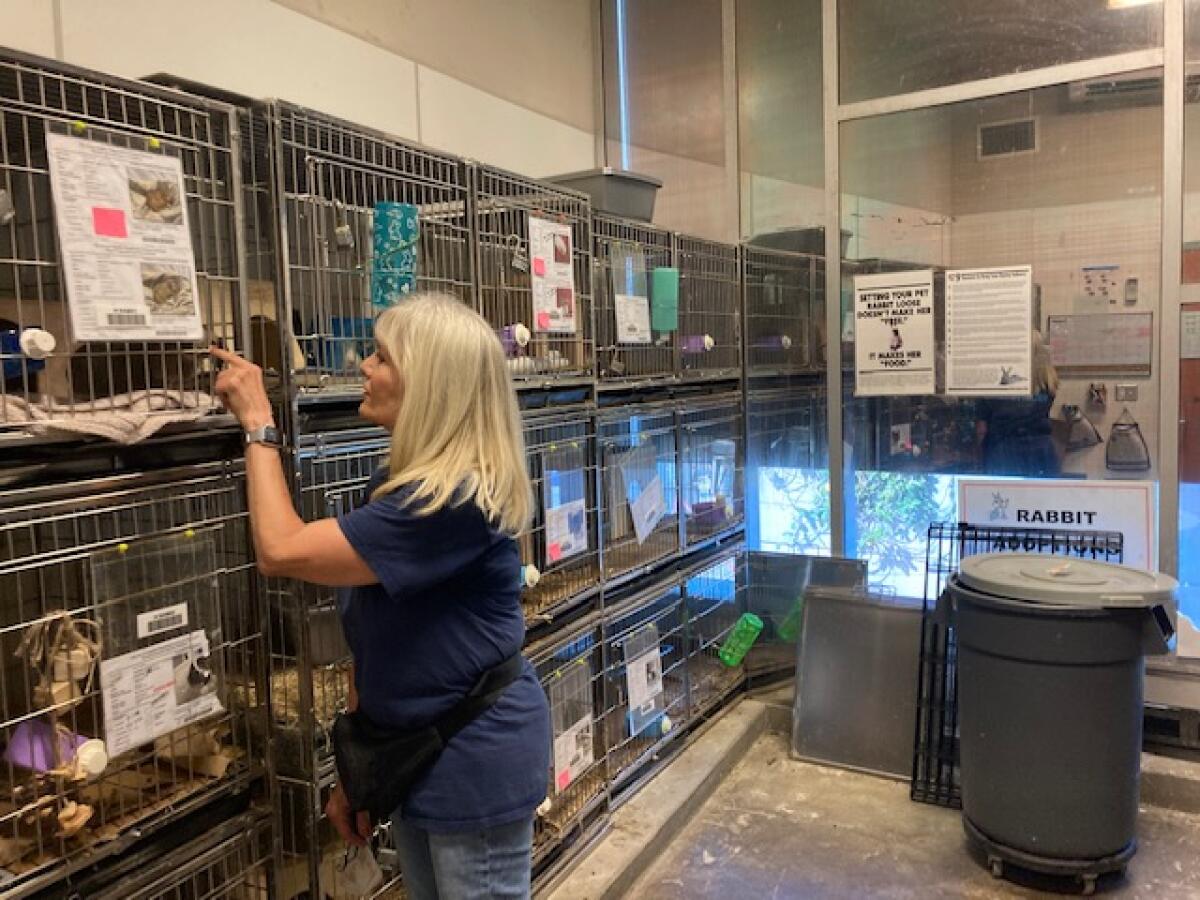
The letter also noted an “out of control” hamster situation, including “frequent escapes” and “impregnations due to the difficulty in distinguishing sexes.”
Volunteers at three other L.A. shelters also said that the care of small mammals falls largely to them. They described spending their own money on lettuce and cilantro for the animals and driving to Petco for last-minute supplies. Other times, they’ve had to rely on animal rescue groups and donors for necessities, such as cages.
“I’m infuriated,” said Bunker, 74, an entertainer and piano and voice teacher who has volunteered for four years at the Harbor shelter. “We’re the only ones taking care of them.”
Animal Services spokeswoman Agnes Sibal said the department doesn’t ask volunteers to purchase items for animals. Staff, she said, have the ability to order food through vendors.
Asked about the staff’s role with small mammals, Sibal said they are involved.
“L.A. Animal Services staff provides care for the animals throughout the day, during feedings, cleaning of cages and daily monitoring of animals,” she said.
Bunker disagreed with Sibal’s assertion, saying Harbor has no employees assigned to oversee small mammals.
Bunker said she was told by city staff on Friday that she can’t return to the shelter until she re-signs a form laying out the rules for volunteers.
Department officials didn’t immediately respond to questions about Bunker.
With about 300 employees, the department relies heavily on volunteers to feed animals, walk dogs, oversee adoptions, do laundry and more.
Staff absences are hobbling that system. On Sept. 17, Juan Rivera, director of volunteer programs, asked volunteers to come in following a COVID-19 outbreak at the Harbor and West Valley shelters.
“We are down 20 staff from both locations for at least six days and up to 9 more days until [staff] begin to test negative,” Rivera wrote in an email to the volunteers.
City protocol allows employees to quarantine for 10 days if they are exposed at the workplace to someone who has COVID-19. The policy states that employees are not required to be tested during the quarantine period.
At some animal shelters, staff may be assigned to oversee the small-mammal rooms, but volunteers said employees are rarely seen in those areas.
There’s “a feeling that, well, if you don’t do it, they aren’t going to be taken care of,” said one small-mammal volunteer, who like others requested anonymity to speak freely about conditions at the shelters. “Without us, without volunteers there ... animals would definitely die.”
Sibal, the Animal Services spokesperson, said that when “volunteers let staff know of an issue, it is addressed by supervisors and staff.”
At the Harbor shelter, the hamsters were moved to a separate room after volunteers sent their letter to Ramirez.
On a recent morning, squeals greeted Bunker when she leaned into cages with guinea pigs. She was there to clean cages.
She tossed out the soiled newspaper and used water and vinegar to wipe down the floors and walls of a rabbit cage. She replaced the cardboard and straw mats, refilled the water bottle and tucked lettuce into the cage.
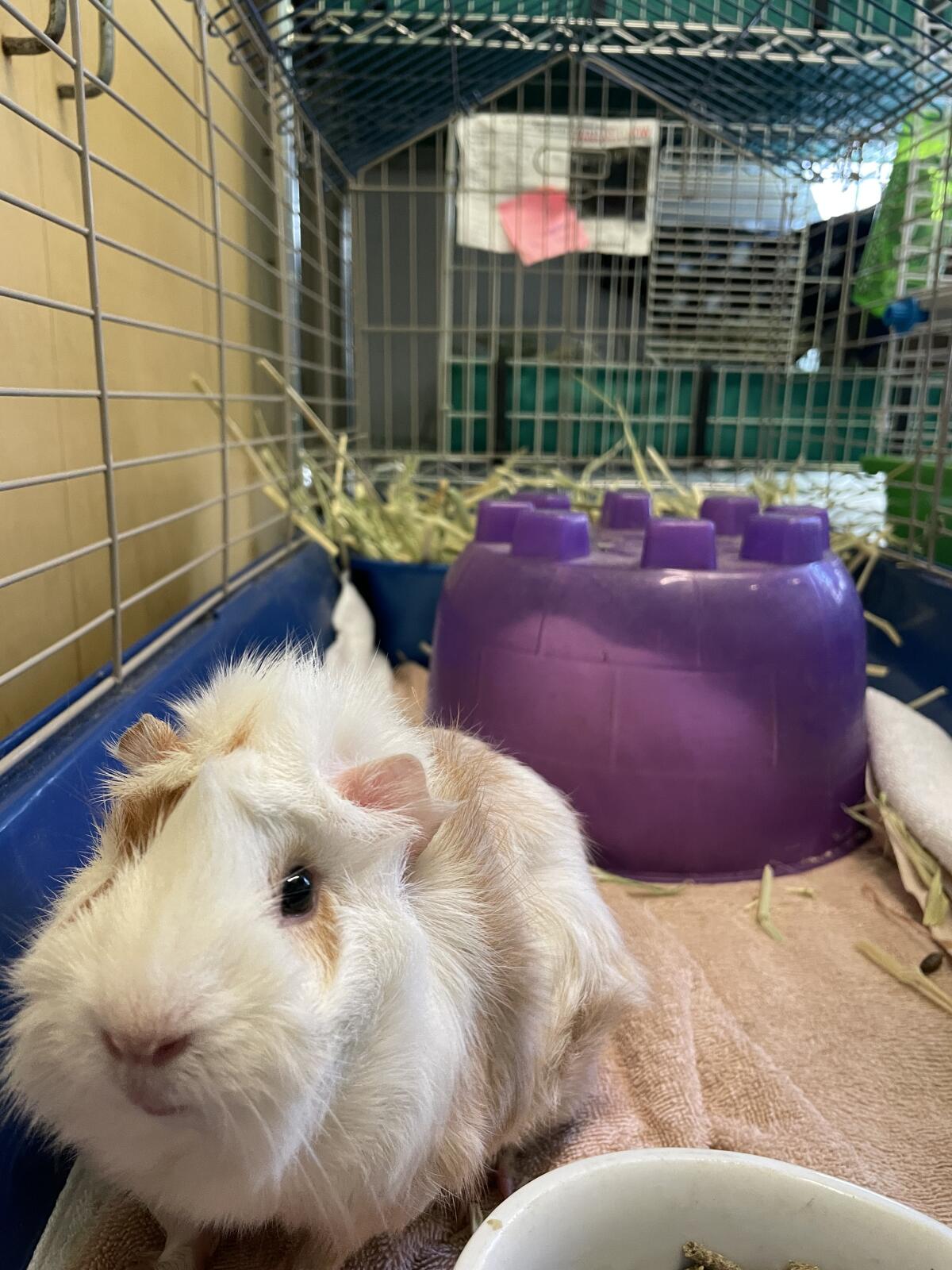
For the year to August, the department received nearly 700 rabbits at all its shelters, a 52% increase over the same period last year. Statistics about guinea pigs aren’t available on the city’s website, but rescue groups estimate that there are more than 80 at the shelters — far more than in previous years and an indication that people are returning animals that were adopted early in the pandemic.
“All animals taken in under the protective cloak of the city need to have their basic needs met,” said Claire Badener, a volunteer with L.A. Guinea Pig Rescue, who visits the city’s shelters about once a week. “Staff training in small animal care is insufficient.”
She said she has seen accidental breeding — males and females mistakenly put in the same cage — in the small-mammal room. She shared a photo, taken in August by a volunteer at the West Valley shelter, of what appeared to be maggots in a guinea pig cage.
Volunteer Queenie Chen, who runs an Instagram page that highlights small animals, alleged in a post that four litters of hamsters were euthanized shortly after they were born.
In one instance, according to Chen’s Instagram page, volunteers found a hamster “forgotten” in a bin underneath a box in a storage room at the West Valley shelter.
Chen declined to be interviewed. Sibal didn’t respond to a question about the allegations.
On a recent morning, a Times reporter visiting the small-mammal room at the Chesterfield Square shelter in South Los Angeles found the lime-green ceiling and walls coated in a visible layer of dust and fur.
Cages of rabbits and guinea pigs lined the walls; other cages rested on the floor because of a lack of space. Notes posted on the cages by volunteers indicated the last time they had been cleaned.
L.A.’s animal services agency is understaffed and relies on volunteers. At one overcrowded shelter, dogs sit in kennels for weeks or months without being walked.
Dr. Gayle Roberts, a veterinarian in private practice in Irvine, said Animal Services has a reputation of being “limited by their resources” and understaffed.
Roberts sees about 10 rabbits a week that have been transferred from Animal Services for spaying and neutering. She also sees animals from the shelters that need medical attention.
Two male rabbits from Animal Services that were put in the same cage — a mistake, since they will fight to the death — came in recently. One had a shredded ear; the other’s eye was severely gouged, she said.
“It takes an experienced person to handle a rabbit,” she said. “You really have to know what you’re doing.”
Alison Simard, a spokeswoman for Councilmember Paul Koretz, who chairs a committee on animal issues, said Koretz’s office is working on a report that will address the small mammals at the shelters.
The councilman, a candidate for city controller, held two meetings this summer following a Times article on conditions for dogs at the city shelters.
Harrison Wollman, a spokesman for Mayor Eric Garcetti, said the mayor’s office is working with Animal Services to bring on new staff and to develop a budget request for additional staff next year.
Wollman said this summer that the city’s COVID-19 sick-leave policies are being reviewed. He said Friday he didn’t have an update on any policy changes.
More to Read
Sign up for Essential California
The most important California stories and recommendations in your inbox every morning.
You may occasionally receive promotional content from the Los Angeles Times.


